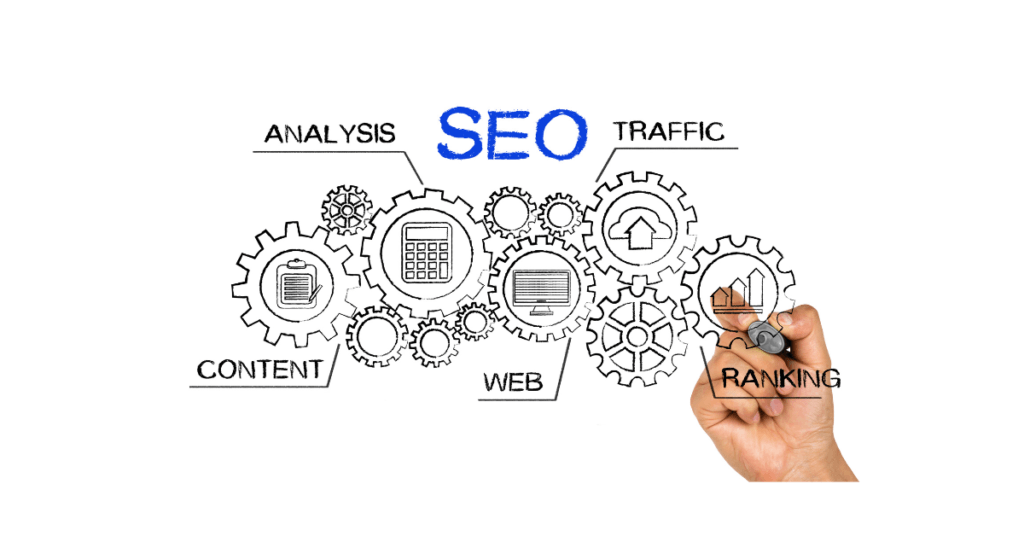Best AI tools for technical SEO: Top Tools for Crawling, Audits & Performance
What is Technical SEO?
Technical SEO refers to optimizing your website’s underlying structure and mechanics to make it search engine-friendly. It’s like building a solid foundation for your SEO efforts, ensuring search engines can easily crawl, index, and understand your website, ultimately boosting your chances of ranking higher in search results.
Here’s a breakdown of what Technical SEO encompasses:
- Crawlability:
- Ensuring search engine bots can access and navigate all your website pages.
- Optimizing site structure and internal linking for smooth navigation.
- Fixing broken links and resolving crawl errors.
- Indexing:
- Helping search engines understand your website content.
- Optimizing page titles, meta descriptions, and headers for clarity.
- Implementing structured data markup to categorize your content accurately.
- Website Speed:
- Making your website load quickly for a better user experience.
- Optimizing images, compressing files, and utilizing caching mechanisms.
- Choosing a reliable web hosting provider.
- Mobile-friendliness:
- Adapting your website to display flawlessly on all devices, especially mobile phones.
- Using responsive design or dedicated mobile versions.
- Complying with Google’s mobile-first indexing guidelines.
- Website Health:
- Maintaining a healthy website free of technical issues like duplicate content, server errors, and security vulnerabilities.
- Regularly monitoring website health through tools and analytics.
- Implementing proper security measures to protect your website and its data.
By focusing on these key areas, you can lay the groundwork for a successful SEO strategy. Remember, strong technical SEO acts as a backbone, allowing your content and off-page SEO efforts to shine and truly impact your search engine ranking.
How do AI tools help technical SEO?
AI tools are revolutionizing the way we approach technical SEO, bringing us a wave of efficiency, accuracy, and deeper insights. Here’s how these tools are transforming the landscape:
- Automating Repetitive Tasks:
- Crawling and Audits: AI-powered crawlers like DeepCrawl and Screaming Frog meticulously scan your website, identifying technical issues like broken links, indexing problems, and mobile-friendliness concerns, freeing you from manual checks.
- Log File Analysis: Tools like SEMrush analyze website logs to uncover crawl errors, identify blocked resources, and understand search engine interactions, saving you hours of manual analysis.
- Prioritizing Issues and Actions:
- Intelligent Insights: AI analyzes the impact of various technical issues, prioritizing those with the greatest potential SEO impact. Tools like Botify highlight critical fixes first, ensuring you focus your efforts on the most impactful improvements.
- Actionable Recommendations: AI doesn’t just identify problems; it suggests solutions! Tools like Surfer SEO and Frase provide data-driven recommendations for on-page optimization, improving title tags, headings, and content structure for better ranking.
- Deeper Understanding and Insights:
- Pattern Recognition: AI analyzes vast datasets of SEO data, identifying patterns and trends that humans might miss. This allows tools like Ahrefs to predict potential algorithm changes and recommend proactive SEO strategies.
- Content Optimization: AI goes beyond keywords. Tools like MarketMuse analyze top-ranking content to understand user intent, topic clusters, and semantic relationships, helping you create highly relevant and competitive content.
- Scalability and Efficiency:
- Large Websites: AI tools like DeepCrawl handle complex and large websites with ease, efficiently crawling millions of pages and providing comprehensive insights, a task almost impossible manually.
- Faster Analysis: AI processes data at lightning speed, generating reports and analyses in minutes, compared to the hours or days it might take manually. This allows you to iterate and improve your technical SEO strategy much faster.
Overall, AI tools are not just assistants; they are powerful partners in technical SEO. They automate tedious tasks, prioritize critical issues, offer deeper insights, and scale your efforts, allowing you to focus on strategic optimization and achieve better results with greater efficiency. So, embrace the AI revolution and watch your technical SEO soar!
Unleashing the Power of AI for Technical SEO: The Top Tools to Streamline Your Optimization
In the ever-evolving landscape of search engine optimization (SEO), artificial intelligence (AI) is rapidly transforming the way we approach technical optimization. By automating tasks, identifying patterns, and providing actionable insights, AI tools are empowering website owners and SEO professionals to achieve better results with greater efficiency.
In this article, we’ll explore the top AI tools for technical SEO, categorized into two key areas:
- website crawling and audits, and
- site performance analysis.
I. Website Crawling and Audits
These tools meticulously scan your website to uncover technical issues that could hinder search engine visibility, providing valuable data for optimization:
- DeepCrawl (Lumar): Excels in deep crawling large and complex websites, unearthing hidden technical issues and analyzing site architecture with unparalleled depth. It prioritizes issues based on potential SEO impact, ensuring you focus on the most critical fixes first.
- Screaming Frog SEO Spider: Combines traditional crawling capabilities with AI-powered analysis to identify a wide range of technical issues, including broken links, indexing problems, and mobile-friendliness concerns. Suitable for most website sizes.
- Botify: Leverages AI to intelligently prioritize crawl findings, saving you time and effort by highlighting those with the highest potential impact on SEO performance. Ideal for large and complex websites.
- SEMrush Site Audit: Offers a comprehensive AI-powered site audit that not only identifies technical issues but also suggests actionable improvements for mobile-friendliness, indexing, and overall SEO health.
II. Site Performance Analysis
These tools meticulously evaluate your website’s loading speed and performance, providing valuable insights for optimization:
- WebPageTest: Conducts in-depth website speed analysis across various locations and devices, generating detailed reports with actionable recommendations.
- Pingdom: Monitors website performance in real-time, displaying load times, waterfall charts, and specific optimization suggestions.
- GTmetrix: Provides a comprehensive website speed analysis, including page load timelines, waterfall charts, and optimization recommendations.
- Google PageSpeed Insights: A free tool by Google that analyzes website speed on both mobile and desktop devices, offering valuable optimization insights.
- Sitebulb: Goes beyond traditional crawling by offering advanced performance analysis features, generating comprehensive reports on loading times, resource usage, and potential bottlenecks.
Bonus Tools:
- Ahrefs Site Audit: Expands beyond technical SEO to analyze backlink profiles, identify content gaps, and provide competitor insights.
- Rank Math (WordPress plugin): Offers AI-powered suggestions for on-page optimization, improving website indexing and enhancing search engine visibility.
Choosing the Right Tool for Your Needs
The optimal tool for you depends on your website’s size, complexity, and specific SEO goals. Consider the following factors:
- For deep crawls and complex sites: DeepCrawl, Botify
- For general crawls and smaller sites: Screaming Frog
- For comprehensive site audits with SEO insights: SEMrush Site Audit
- For detailed performance analysis: WebPageTest, Pingdom, GTmetrix
- For free speed analysis: Google PageSpeed Insights
By effectively integrating AI-powered tools into your technical SEO strategy, you can streamline your optimization efforts, address technical issues more efficiently, and ultimately achieve higher search engine rankings and improved user experiences.
AI Tools for Technical SEO: Features, Pricing & Best Uses
| Tool Category | Tool Name | Features | Pricing | Free/Paid | Best For |
| Website Crawling & Audits | DeepCrawl (Lumar) | Deep crawls complex sites, prioritizes issues, analyzes site architecture | Custom Quote | Paid | Large & complex websites |
| Screaming Frog SEO Spider | Powerful crawler with AI analysis, detects broken links, mobile-friendliness concerns | £99-£499/year | Paid | Most website sizes | |
| Botify | AI prioritizes crawl findings, saves time, identifies high-impact issues | Custom Quote | Paid | Large & complex websites | |
| SEMrush Site Audit | AI-powered audit, mobile-friendliness & indexing suggestions, SEO insights | $99.95-$499.95/month | Paid | Comprehensive site audits with SEO focus | |
| Site Performance Analysis | WebPageTest | Detailed speed analysis across locations & devices, actionable reports | Free & Paid Plans | Free limited, Paid advanced | In-depth performance analysis |
| Pingdom | Real-time performance monitoring, load times, waterfall charts, optimization suggestions | Free & Paid Plans | Free limited, Paid advanced | Basic performance monitoring & optimization | |
| GTmetrix | Page load timelines, waterfall charts, optimization suggestions | Free & Paid Plans | Free limited, Paid advanced | Popular choice for analysis & optimization | |
| Google PageSpeed Insights | Free tool by Google, analyzes speed on mobile & desktop, optimization recommendations | Free | Quick free analysis | ||
| Sitebulb | Advanced analysis features, comprehensive reports on load times, resource usage, bottlenecks | Custom Quote | Paid | Deep performance analysis & optimization | |
| Bonus Tools | Ahrefs Site Audit | Technical SEO audit, backlink profile analysis, content gap identification, competitor insights | $99-$999/month | Paid | Comprehensive SEO audit with additional features |
| Rank Math (WordPress plugin) | AI-powered on-page optimization suggestions, improves indexing, enhances visibility | Free & Paid Plans | Free limited, Paid advanced | WordPress users seeking on-page optimization & indexing improvements |
- Prices are as of January 27, 2024, and may change.
- Some tools offer free trials or limited free plans.
- Choosing the right tool depends on your website’s size, budget, and specific needs.
Conclusion:
In a world driven by algorithms and ever-evolving search engine landscapes, embracing AI-powered technical SEO tools is no longer optional, it’s essential. By leveraging their automation, insights, and prioritization prowess, you can streamline your optimization efforts, tackle critical issues efficiently, and ultimately conquer the quest for higher rankings and a thriving online presence. So, arm yourself with the right AI tools, and watch your website ascend to the top of the search engine food chain!
FAQs and Answers:
Q: Which tool is the absolute best for technical SEO?
A: There’s no single “best” tool, as it depends on your website size, budget, and specific needs. DeepCrawl excels for complex sites, Screaming Frog is versatile for most sizes, while Botify prioritizes high-impact issues. Analyze your needs and choose the tool that aligns best!
Q: Are there any free AI tools for technical SEO?
A: Yes! Google PageSpeed Insights offers basic speed analysis, and some tools like Pingdom and GTmetrix have limited free plans. However, for comprehensive features and deep insights, paid plans often provide the best value.
Q: Can I do technical SEO without AI tools?
A: Yes, but it’s significantly more time-consuming and requires deep technical expertise. AI tools automate tasks, prioritize issues, and offer valuable insights, making the process faster, more efficient, and data-driven.
Q: How much do AI tools for technical SEO cost?
A: Prices vary greatly, ranging from free plans with limited features to custom quotes for enterprise-level tools. Consider your budget and prioritize features you need most when making your choice.




